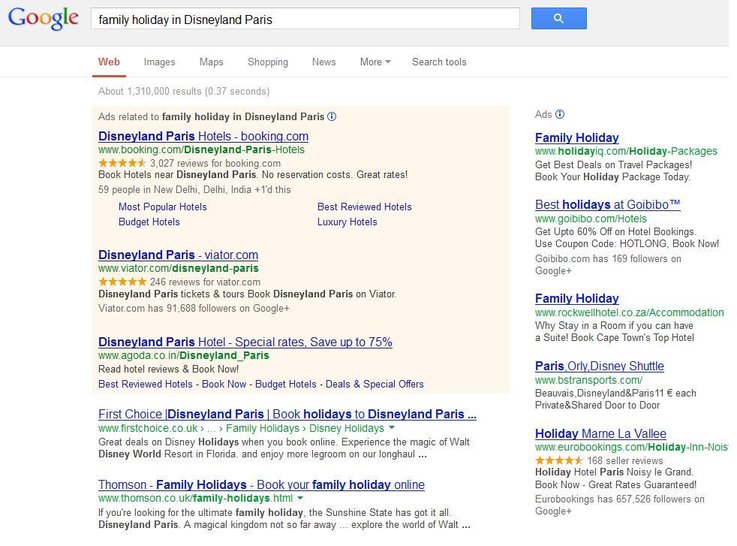Why online travel should offer less choice and more curated content
The travel industry and especially technology and meta-search start-ups have been trying to mimic the natural thought processes of travellers as they start the process of booking a holiday. We’re talking semantic search, of course, but is it really possible and if so what is the best way forward? EyeforTravel hears the views of a self-proclaimed “highly talented Google searcher”.
When someone begins to plan a holiday they more often than not start with a vague notion of what they want – be that a particular climate, country or culture. Andrew Lacy, the founder of Zaptravel, a personalisation travel meta-search business believes that some people might have more exact ideas of what they want to do but not when, or they may know when they want to go but not what they want to do. The promise of semantic is to be able to take these broad desires, understand them, and propose a set of options based on whatever criteria are important.
Before the Internet, these types of questions might be quite common in a physical travel agency and a human might be able to solve them relatively quickly. But online, customers are challenged by a fragmentation of ‘inspiration’ and ‘transaction’ sites. “Neither being good at the other,” says Lacy, who argues that this results in hours being spent identifying and pricing various alternatives. “For example, what good is an amazing hotel private sale website, if you don’t know whether you can fly there. Or what good is a great flight deal if the destination doesn’t warrant a weekend?”
For Lacy, it is clear that if the Internet is going to do as good a job as an offline travel agent, a more integrated approach will be necessary.
Lacy’s company is trying to bring together inspiration and transaction in a way designed to simultaneously inspire and save time and money for users. The start-up is catering to abstract conversational travel queries such as: “I want to take my girlfriend to a romantic city in Italy and stay in a deluxe hotel for a weekend”. It then aims to instantly return a set of inspiring Italian destinations, great for romance and the cheapest time to go for a weekend.
“We are further along than others in the market but still have a lot of work to do in order to fulfill the many desires and constraints customers have for travel,” says Lacy.

So how can the industry understand a traveller’s true intent? EyeforTravel’s Ritesh Gupta questions Lacy to find out.
EFT: How has semantic search evolved in the travel sector?
AL: Semantic technology has been around for quite some time and has been quietly improving. A lot of it is actually in-transparent to the customer - websites that build profiles of what types of trips you click on and then proposing more of those types of trips. We can expect more and more of this over the coming years to the point where our individual experiences interacting with Expedia.com for example might look very different based on our social profiles, prior purchase behaviour and so on.
EFT: How has this technology managed to return a structured search query with very high precision? And as a result, is it now possible to cut down on travel planning and buying time?
AL: Semantic is not just about meaning from a search query, but also about bringing structured content to customers that match what they are looking for.
‘Siri’ has taught us that is it ok to ‘train’ customers to speak a certain way, especially if the result for the customer is to shorten the steps required to set up an appointment. In travel there is a similarly important challenge in being able to bring to the customer ideas, content, prices that they would otherwise take hours to do themselves. Thus ‘meaning’ is only half of what makes a good product, it is what you deliver to the customer after understand the meaning that is equally important. There is real value in this beyond merely increasing precision.
EFT: Do you think it is fair to say that achieving a truly conversational experience with search engines still has technology limitations?
AL: I consider myself a highly talented Google searcher. Given the need to find some information I know the best ways to phrase my search queries to increase the chances of getting good results. I’m not sure I would want to go back to a completely freeform way of searching Google were it to be intelligent enough to understand it.
Humans are adapting to technology just as technology is adapting to humans. The real customer need is not to be understood, it is to filter intelligently the immense nature of the web such that they get a personal, relevant interaction. That interaction doesn’t need to be human-like, it just needs to be efficient and effective.
EFT: The most intriguing battle in the online travel category seems to be between curation and choice. In other words offering more choice. Against this backdrop how important is semantic search in the whole online travel game?
AL: Our belief is that we need less not more choice. Curation is key. We don’t even like the word search - pre-Internet did you ever hear anyone say that they “need to start searching for their next vacation”. I think `search’ as a concept will disappear in 20 years. At Zaptravel we are highly focused on curation to the point where we don’t even want to tell you what we left out. Curation is just part of the job. People are overwhelmed, and we need to technology to make life easier, not more difficult.
Like this article? Sign up for our hand-picked weekly newsletter that includes 5-8 relevant articles delivered straight to your inbox every Thursday.

